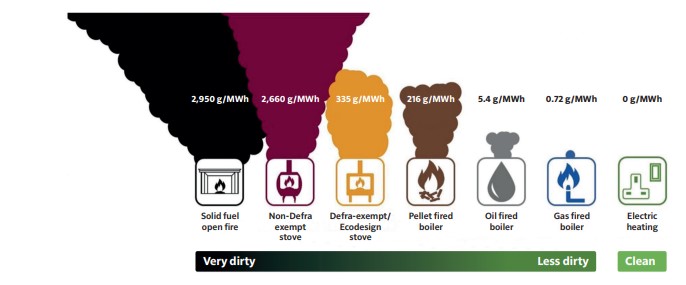
Health and solid fuel appliances
All combustion processes create pollutants and when this takes place inside your home there is scope for those pollutants to impact on your health and that of others.
All solid fuel appliances release harmful particles as well as a large number of other pollutants similar to those found in cigarette smoke.
In his 2022 annual report to the government Chief Medical Officer, Professor Chris Whitty reported that “solid fuels are by far the most polluting method of domestic heating”, and that “Ecodesign wood burning stoves are several hundred times more polluting than gas central heating.”
This diagram taken from the report shows relative emissions from different types of heating appliances (actual emissions will depend on the exact make of appliance, its age, how well it is maintained and operated and the type and quality of the fuel burnt).

Image taken from Chief Medical Officer’s Annual Report 2022 (PDF).
Solid fuel appliances are also generally far more polluting than individual vehicles. As detailed in this report AQEG Biomass Report (PDF) (defra.gov.uk) an Eco-design stove can emit up to six times as much fine particulate matter (PM2.5) as a Euro 6 HGV.
The use of wood in domestic combustion activities has been growing in recent years. Emissions of particulate matter (PM2.5) from domestic wood burning increased by 124 per cent between 2011 and 2021, to represent 21 per cent of total PM2.5 emissions in 2021, an increase of 4% even from 2020. This compares with road transport contributing 13 per cent of PM2.5 emissions.
Much of the pollution emitted from solid fuel appliances can become trapped inside your home. We are currently working with the INGENIOUS research programme to find out more about levels and sources of air pollutants in homes, including the impact of solid fuel appliances.
There are a number of groups and organisations involved with raising awareness and undertaking research into the health impacts of solid fuel burning. You may wish to consider some of their wider findings and recommendations before installing a solid fuel appliance in your home.